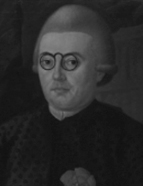

The first printed publication of a historiographical nature by António Ribeiro dos Santos, Memória da Literatura sagrada dos Judeus portugueses desde o tempo da Monarquia (Memoir of the Sacred Literature of the Portuguese Jews since the Time of the Monarchy), dates from 1782, although his unpublished historiographical work dates from the early 1770s. Ribeiro dos Santos’s estate contains several studies of sacred, ecclesiastical and civil history. The latter includes material of the utmost importance to the history of law and institutions, such as the . The historiographical work of António Ribeiro dos Santos has two aspects. One relates to his teaching career and the demands placed on him in the context of the Pombaline reforms and the censorship of the New Code of Public Law of Portugal drawn up by Pascoal José de Melo Freire, a circumstance that gave rise to heated controversy in the vicinity of 1789. The other strand, of a more cultural nature, with aesthetic considerations, concerns the canonist’s interest in Jewish literature by Portuguese authors, anti-rabbinical literature, biblical translations, the history of mathematics, the history of literature, typography, the discoveries and poetry. With regard to his interest not only in history but also in sacred and ecclesiastical geography, António Ribeiro dos Santos undertook intensive research from 1787 onwards, during the rectorship of Rafael de Castro, the results and difficulties of which can be assessed by reading successive versions and notes. The aim was to comply with what was statutorily established in the sense that lecturers should produce their own compendiums for the subjects they taught. In this regard, the Ecclesiastical History of Portugal was the greatest challenge for the canonist. While the general issue could be resolved through the works of Claude Fleury or Giovanni Lorenzo Berti, the national part required a complete overhaul, which entailed difficulties in finding credible documentary evidence, as he vehemently points out. Another historiographical challenge, related to his activity as censor, stems from the need for argumentation during the intense controversy with his colleague Pascoal de Melo Freire. His interventions in the Review Board of the New Code, that is, his contribution to the reform of part of the still-valid Philippine Ordinances, required particular care in historical invocation, insofar as Ribeiro dos Santos, contrary to Melo Freire’s rationalist postulation of enlightened absolutism, called for a reformism that would rescue traditional historical structures. Hence the intense and in-depth recourse to the history of political institutions that transpires in the texts of the censures and which involved many partial essays, such as Antiguidades de Portugal acerca das diversas classes de Nobreza (BNP, code 4595, vol. 13, pp. 1-172) or Da observância dos nossos maiores sobre os artigos que juraram guardar relativamente às coisas do Estado (BNP, code 4670, vol. 13, pp. 1-172). 4595, vol. 13, pp. 1-172) or Da observância dos nossos maiores sobre os artigos que juraram guardar relativamente às coisas do Estado (BNP, cod. 4670, pp. 189-213).
This work is financed by national funds through FCT - Foundation for Science and Technology, I.P, in the scope of the projects UIDB/04311/2020 and UIDP/04311/2020.
